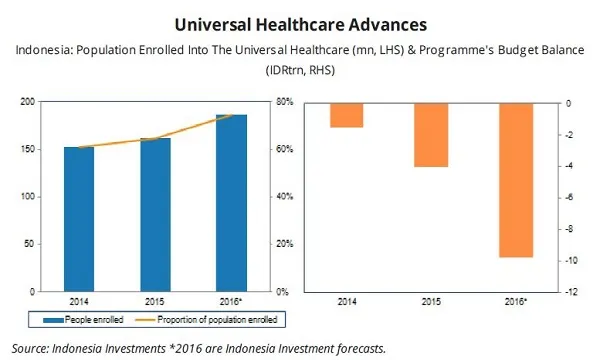
Chart of the Week: Financial challenges stall Indonesia’s rising healthcare
Private health expenditure remains a consistent driver.
Indonesia’s economic growth will serve as the foundation for the country’s nascent healthcare system, but several headwinds await before it can finally bloom.
According to a report by BMI Research, while prospects for Indonesia’s healthcare sector remain robust, challenges will be acute in the short term, including financial roadblocks facing its universal healthcare scheme, the Jaminan Kesehatan Nasional (JKN).
“According to the local news source, the National Social Security Agency (BPJS) which runs the scheme has incurred a deficit of IDR4 trn (USD30 2mn) in 2015, up considerably from its IDR1.5trn (USD113mn) deficit in 2014,” BMI Research said.
“This is a result of claims continuing to outpace premiums collected, with Investor Indonesia projecting the deficit to widen to IDR9 trn (USD680mn) by the end of 20 16 as coverage of the population expands,” the report added.
Meanwhile, to address this, BMI Research said the government will be looking to increase the monthly premiums per person from IDR19 ,225 (USD1.4 ) to IDR23,000 (USD1.7). However, they explain that such an increase will have negative ramifications for lower-income households and impinge upon healthcare access.
“Authorities will have to strike a balance between the needs for financial sustainability and wider coverage, a challenging task considering the complexity of the universal healthcare scheme,” BMI Research said.
“Consequently, additional adjustments to the JKN will be forthcoming in the short term, directly affecting both private healthcare providers and pharmaceutical firms operating in Indonesia,” the report added.



















 Advertise
Advertise





